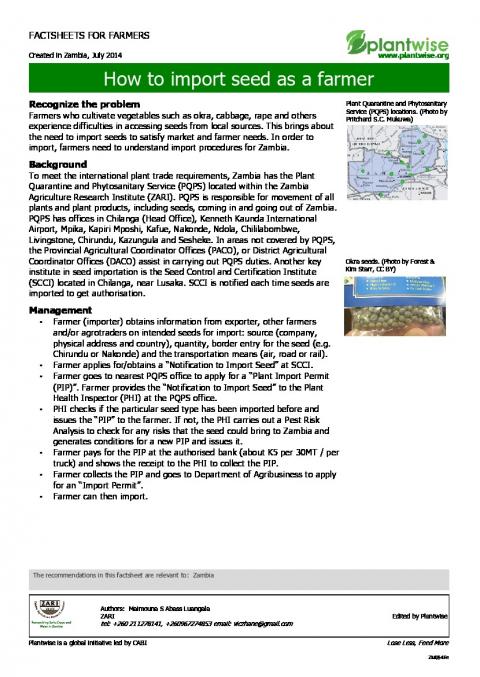FACTSHEETS FOR FARMERS
www.plantwise.orgCreated in Zambia, July 2014
How to import seed as a farmer
Recognize the problem
Farmers who cultivate vegetables such as okra, cabbage, rape and others
experience difficulties in accessing seeds from local sources. This brings about
the need to import seeds to satisfy market and farmer needs. In order to
import, farmers need to understand import procedures for Zambia.
Background
To meet the international plant trade requirements, Zambia has the Plant
Quarantine and Phytosanitary Service (PQPS) located within the Zambia
Agriculture Research Institute (ZARI). PQPS is responsible for movement of all
plants and plant products, including seeds, coming in and going out of Zambia.
PQPS has offices in Chilanga (Head Office), Kenneth Kaunda International
Airport, Mpika, Kapiri Mposhi, Kafue, Nakonde, Ndola, Chililabombwe,
Livingstone, Chirundu, Kazungula and Sesheke. In areas not covered by PQPS,
the Provincial Agricultural Coordinator Offices (PACO), or District Agricultural
Coordinator Offices (DACO) assist in carrying out PQPS duties. Another key
institute in seed importation is the Seed Control and Certification Institute
(SCCI) located in Chilanga, near Lusaka. SCCI is notified each time seeds are
imported to get authorisation.
Management
• Farmer (importer) obtains information from exporter, other farmers
and/or agrotraders on intended seeds for import: source (company,
physical address and country), quantity, border entry for the seed (e.g.
Chirundu or Nakonde) and the transportation means (air, road or rail).
• Farmer applies for/obtains a “Notification to Import Seed” at SCCI.
• Farmer goes to nearest PQPS office to apply for a “Plant Import Permit
(PIP)”. Farmer provides the “Notification to Import Seed” to the Plant
Health Inspector (PHI) at the PQPS office.
• PHI checks if the particular seed type has been imported before and
issues the “PIP” to the farmer. If not, the PHI carries out a Pest Risk
Analysis to check for any risks that the seed could bring to Zambia and
generates conditions for a new PIP and issues it.
• Farmer pays for the PIP at the authorised bank (about K5 per 30MT / per
truck) and shows the receipt to the PHI to collect the PIP.
• Farmer collects the PIP and goes to Department of Agribusiness to apply
for an “Import Permit”.
• Farmer can then import.
The recommendations in this factsheet are relevant to: Zambia
Authors: Maimouna S Abass Luangala
ZARI
tel: +260 211278141, +260967274853 email: viczhane@gmail.com
Edited by Plantwise
Plantwise is a global initiative led by CABI
ZM034En
Lose Less, Feed More
Plant Quarantine and Phytosanitary
Service (PQPS) locations. (Photo by
Pritchard S.C. Mukuwa)
Okra seeds. (Photo by Forest &
Kim Starr, CC BY)

